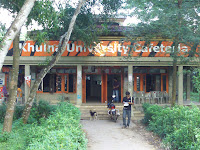Up at the crack of dawn again for a return drive to Jhenidah ~ another part of the district this time ~ we're off to Mehepur to visit a local government-funded organisation called Subah Samajik Unnayan Sangstha. Subah works to improve the conditions of the under-privileged who have no access to food, health services and education, especially women and children of low caste vunerable groups. It runs programs ranging from supporting a women's farming cooperative to increasing school enrolment of minority and ultra poor children, who often end up as child labour to increase household income.
 |
| a Bangla staple |
 |
| children picking chillies |
Subah also runs a 'tobacco free society' advocacy program lobbying for the implementation of a 'Tobacco Control Law'. This is predominantly aimed at British American Tobacco ~ TAB is the second largest global market player with brands such as Dunhill, Kent and LuckyStrike ~ which is employing farmers in the region to grow and cure tobacco.
 |
| tobacco curing shed |
Curing tobacco is known to cause bronchial illnesses, lung cancer and premature death among farmers and their families, not to mention its detrimental effects on the environment ~ tobacco curing requires a lot of wood burning ~ and its perpetuation of poverty and hunger as it diverts prime land from food production. As it stands, around 65.3 million Bangladeshis do not have enough food today and the population continues to grow. But I digress..
Until now Subah has been coasting on funding from the Ministries of Health and Education, as well as some funding from HOPE for Children UK and BRAC, the biggest NGO in Bangladesh, but with the recent change in government, Subah's future may be in doubt.
We visit the women's farming coop and Subah's director proudly shows off his English skills during the consultation session. The women are enterprising but lack capacity to go beyond the middle (wo)men and have no access to city markets or marketing mechanisms, despite the fact that there is a high level of literacy and just about everyone present has a mobile phone. When we make some simple suggestions about how they could use their mobiles to access markets beyond their immediate area, the women look at us in amazement and agree that it's an interesting idea! They are also keen to find out how they can preserve their crops longer, but without electricity and cooling mechanisms this a little trickier to solve. As it turns out, they already engage in vegetable pickling and fruit preserving but it is predominantly for own household use and the women have not considered taking products such as pickles and dried mango to market. It is clear some entrepreneurial capacity building would be useful for both the community and Subah to move towards a more market-oriented and sustainable future. We go for a stroll around the village and the women proudly show off their crops and crop processing skills.
 |
| rice processing machine |
 |
| vegetable crop |
 |
| showing off |
|
On the way home we run into a number of Durga Puja processions. On the fifth day of the festival Hindus bid farewell to Durga, ending with immersion in the river of the idols of goddess Durga and her children Lakshmi, Sarawati, Kartik and Ganesh. The idols are paraded through the streets where devotees, with tearful eyes and red paint splashed all over their faces, bid farewell to their goddess for another year. Relative peace and quiet will return to the streets of Khulna and I look forward to a good night's sleep.



 Set up in 1991, Khulna University is quite a young University and despite its young age has managed to establish 21 faculties.
Set up in 1991, Khulna University is quite a young University and despite its young age has managed to establish 21 faculties. 


 Before we leave the university grounds, we stop for cold drinks at the uni cafetaria, which makes the caf in my Aussie uni look like a five-star restaurant!
Before we leave the university grounds, we stop for cold drinks at the uni cafetaria, which makes the caf in my Aussie uni look like a five-star restaurant!


















